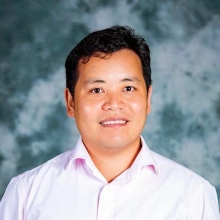ChEMS Seminar: Accelerated Discovery and Design of Perovskite-based Advanced Functional Materials

Department of NanoEngineering
University of California, San Diego
Abstract: As a rapidly growing area of materials science, high-throughput computational materials design is playing a crucial role in accelerating the discovery and development of novel functional materials. In this talk, Yang will introduce the strategy of high-throughput first-principles computational materials design, and use several research examples to demonstrate this approach in the accelerated design of functional materials. In particular, he will talk about his group's recent research progress on the perovskite-based functional materials: perovskite-based two-dimensional electron gas (2DEG) and hybrid organic-inorganic double perovskites for optoelectronics. For more information, a brief research summary can be found below. i) The two-dimensional electron gas (2DEG) formed at the interface between two wide-band-gap perovskite insulators such as LaAlO3 and SrTiO3 has attracted intense interests because of their potential applications in next-generation nanoelectronic devices. Yang will show that he is able to realize a high-throughput design of SrTiO3-based 2DEG systems by introducing a group of combinatorial materials descriptors. ii) Hybrid organohalide perovskites have emerged as one class of most promising light-harvesting materials for the next-generation solar cells because of their exceptional properties, such as an appropriate band gap, high-absorption coefficient, long carrier diffusion length, and high carrier mobility. Despite their promising applications, large-scale industrial applications of hybrid halide perovskites are limited by several major challenges, such as poor stability of perovskites and the demand for lead-free perovskites. Yang will discuss his group's ability to identify 43 candidate halide double perovskites for photovoltaic applications using high-throughput first-principles electronic structure calculations.
Bio: Kesong Yang is an assistant professor in the Department of NanoEngineering at University of California San Diego. Before joining UC San Diego in 2013, he worked at Duke University as a postdoctoral research associate, and co-developed the largest quantum materials database, AFLOWLIB.org. He received his Ph.D. degree in atomic and molecular physics at Shandong University in June 2010, and won the highest award, the Top 100 National Excellent Doctoral Dissertation Award in 2012. His research interests are in the areas of computational materials science and materials physics, focusing on materials modeling and simulation using first-principles (or ab-initio) calculations. Yang has authored 54 peer-reviewed publications, with more than 3000 total citations and an h-index of 25.
.
Host: Xiaoqing Pan
Share
Upcoming Events
-
MSE Special Seminar: Architecting 3D Complex Materials for Sustainability
-
MSE Special Seminar: Decarbonizing Industries for a Climate-resilient Future - From Renewable Energy to Sustainable Material Recovery
-
CEE Seminar: BIM and the Digital Twin
-
MSE Special Seminar: Revolutionizing Battery Technology - Engineering Quantum Materials for Enhanced Safety and Performance in Solid Electrolytes
-
MSE Special Seminar: Designing Sustainable Soft Matter from the Molecule Up
